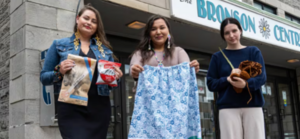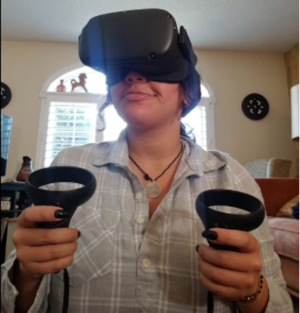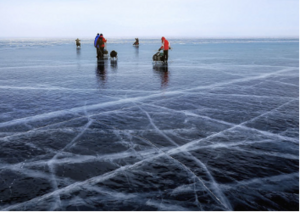Abe Okpik
A Future of Revitalized Language and Culture with Digital Technologies
I am Abe Okpik an 87-year-old Elder of the Iqaluit community, I have witnessed a profound transformation in our ways of being, our traditions, and how we teach and learn. Not long ago, I feared that our language the heart of our identity was slipping away following the assimilation attempts of residential schools. I can recall the sterile concrete walls, the 24feet-by-24feet classrooms with all the desks lined neatly, and the warning on the chalkboard saying ENGLISH ONLY! Anyways, those days are gone, now, I see children fluent in both Inuktitut and English, thanks to an immersive language curriculum and hands-on cultural programs. These aren’t just concrete classrooms like my days; they’re living spaces where our youth weave baskets, chant songs, and learn sacred dances while being guided by their teachers and elders.
Technology has its role here too, particularly virtual reality (VR). Although I was hesitant to adopt VR at first, I later saw how it could bridge the gap between the physical and digital realms, it has allowed a piqued interest from youth to experience ceremonies, rituals, and heritage events as if they were physically present, regardless of geographical barriers. We were starting to notice more youth gravitating towards digital Western games and they were less inclined to attend cultural events and ceremonies but, ever since the new computer science teacher at the school introduced VR it offered the concept of blending digital technologies with authenticity access for cultural preservation. With advancements like haptic feedback and AI-driven avatars, VR experiences are becoming increasingly realistic and engaging. The new multimodal media avenues have not only brought together our youth and culture but are true calls to action for undoing some of the injustices of the residential school system.
Economic Growth and Prosperity
Our economic landscape has changed dramatically over the last few decades. Where once we depended solely on external supply chains, we now are self-sufficient. Small businesses rooted in traditional crafts and modern innovations thrive with the emergence of fintech startups from students who have been educated by the Nakasuk School, pursued higher education and returned with their knowledge to grow the local digital trade economy. When these students return, they open sustainable enterprises, mentor younger generations, and create technologies that honour the land and water. This has led to record-low unemployment rates in our community as a testament to the success of the educational model that Nakasuk utilizes. Our graduates are not just job seekers; they are creators, innovators, and contributors to a diversified economy. In the past, many of our graduates would pursue fishing, which is a contractionary trade due to competition from corporations, and those who left Iqaluit would settle in the cities that educated them, leading to a rapidly decreasing population. However, now, we are seeing our population begin to grow again with new, young families settling here, resulting in a growth in our real GDP per capita by 4%.
Another problem that plagued our community in the past was food security and price inflation given the harsh climate and limited growing seasons. Through hands-on learning initiatives from the Nakasuk curriculum encouraging students and researchers to collaborate on projects to develop climate-resilient greenhouses and vertical farming techniques motivated many of our youth to pursue agriculture-science education. This has ensured a consistent supply of fresh produce year-round while blending traditional food practices, like hunting and foraging, to create a supply chain that is impermeable to the weather. The economic benefit of this did not stop at supply chains but, also trickled down to reduced food inflation, especially concerning fresh produce prices. Our communities no longer rely heavily on costly imports due to high carbon taxes and supply chain delays. Hence, this has significantly reduced the financial burden on families and has made healthy, affordable food accessible to everyone in the community regardless of economic status. Many thanks to the Nakasuk School for revitalizing a sense of love for learning in our youth so they continue to pursue further education in comparison to the colonial history of educating our children for assimilation.
The Future of Learning and Youth
As an Elder, I have watched our youth flourish in ways that I could only dream of when I was their age. Now learning is not just about acquiring knowledge as the colonial world introduced, it is about embodying it, living it, and passing it forward. Our youth are the lifeblood of our community, I see them thriving in an environment that harmonizes the wisdom of our ancestors with the tools and technologies of the modern age. The school system I mentioned prior was frowned upon and seen as a secondary institution due to the injustices I and our ancestors endured. However, with Nakasuk, learning has become a deeply communal process. It is no longer confined to classrooms but occurs in the heart of our communities, on the land, and even within the digital realm.
One of the most transformative aspects of learning in this era is the role of technology, and I hope this trend continues well beyond my time. As I described earlier, Virtual and augmented reality have not only preserved our cultural practices but also elevated how they are passed on. My most heart-warming moment occurred when I saw a young lad named Nyskuy sitting in his university dorm room at York, participating in a storytelling circle back home with his Meta VR-5.0 headset. Completely unimaginably, during my time, it seemed as though the animal spirits were projecting his lived experience and soul into the very essence of the ceremony. Our youth are no longer isolated from their traditions and culture after they graduate from Nakasuk and go elsewhere for further education, rather the technology, and appreciation for lived experiences that the school has instilled in them from a young age stay with them. I do have one regret, and that is we haven’t been able to accredit Nakasuk school to open their post-secondary college, we have been in works with local and federal governments for funding and hope the progress Nakasuk has brought to our community can act as the foundation for this new educational venture. Until than our youth may be distant from their homeland but not in isolation, they are still a part of the collective community, and a spot is always reserved for them as it awaits their arrival.
Climate Change and The Future
So far most of my stories have taken a positive tone regarding the flourishing of our traditions, the economic growth and the future of our youth ,but I haven’t been completely sincere. I have underplayed the profound transformations in our environment that every day. The Arctic is warming at a rate nearly twice the global average that was predicted in 2024, leading to significant environmental changes that threaten our communities. Nakasuk has done an excellent job of improving our living standards but, it cannot reverse or halt the infrastructure challenges, geographic relocation, and biodiversity erosion. First, the thawing of permafrost has become a pressing issue, causing ground instability that affects the foundations of our homes, roads, and Nakasuk as well. This is both a safety and financial burden on families because insurance companies are going bankrupt due to the increased costs, and few that remain locally charge high premiums. The Government of Canada has recognized these challenges and is investing in foundation re-engineering projects for our schools and working on sourcing 3rd party venture investment but, we are worried that the little economic progress we have seen in the past decades will fade in the coming century. Second, rising sea levels have accelerated coastal erosion, threatening many of our coastal settlements. Some areas are experiencing land loss and forcing communities to consider relocating south, but this is easier said than done as the process is both emotionally and economically taxing. The City of Iqaluit is working on subsiding new home construction, but without support from federal entities, this task is becoming financially taxing. The third and most pressing matter is the effect on biodiversity with some plants and animals moving northward while others face decline. The native arctic fox, caribou, and ringed seal have moved more north to escape the change but, our communities are shifting more south creating this forced separation from our hunting practices. This affects the availability of traditional foods and medicinal plants. The Nunavut Climate Change Centre has been at the forefront of climate change research, partnering with the University of Toronto and York University to find solutions, but the data is not promising.
Reflecting on these challenges, it is clear that while our community has made strides in preserving traditions and improving living standards, the escalating impacts of climate change overshadow these achievements. The warming Arctic threatens not only our homes, culture, and survival, but the future of Nakasuk and its world-famous teaching pedagogies. Yet, in acknowledging these truths, we strengthen our resolve to confront these challenges together, ensuring that future generations can harness the principles of a justice education to tackle yet another issue of an ever-changing landscape.



